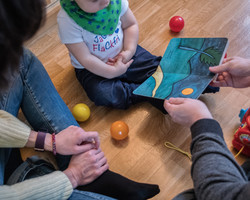Strengthening intersectoral work to tackle violence against children in the Baltic States

WHO/Malin Bring
WHO is supporting its Member States to strengthen intersectoral work to tackle violence against children through capacity-building initiatives. The latest in a series of such initiatives were two workshops focusing on the Baltic States. The workshops organized by WHO were held on 8 to 11 January 2019 in Vilnius, Lithuania and provided a platform for discussing experiences, strengths and challenges regarding evidence-based parenting programmes as effective measures to prevent child maltreatment.
Participants from Lithuania, Latvia, and Estonia, along with international experts, took part in the Baltic workshop to develop greater capacity in the implementation of parenting programmes. This workshop was immediately followed by a national Lithuanian workshop to discuss implementation at municipal levels.
The Nordic and Baltic countries have a long history of collaboration and sharing of experience in a number of areas. Preventing child maltreatment has been the focus in two WHO workshops in collaboration with the Nordic Council of Ministers in Riga (2017) and Vilnius (2018) to stimulate the exchange and implementation of good practices in the Nordic and Baltic region. Lithuania is one of the countries that has shown great commitment in the field of violence prevention, and in 2017 banned corporal punishment in all settings. Violence prevention has been indicated as one of the priorities for collaboration between the WHO Regional Office for Europe and the Ministry of Health of Lithuania. Linas Kukuratis, Minister of Social Security and Labour of Lithuania, stated, “Child abuse cases highlight an extended social issue. Parenting programmes are effective preventive measures that will also help the Ministry understand family needs and barriers.”
Given the complexity and cross-sectoral responsibility for preventing and protecting children from violence, intersectoral collaboration is paramount in achieving the Sustainable Develop Goal Target 16.2 calling for an end to all forms of violence against children by 2030. In the “European status report on preventing child maltreatment” it was found that almost all countries surveyed (90%) reported a system in place for regular exchange of information between sectors and stakeholders on preventing violence against children.
From dialogue to action: corporal punishment in all settings now prohibited in 66% of countries in the Region
Countries are making good progress on strengthening laws. The prohibition of corporal punishment in all settings now covers 66% of countries of the European Region – an improvement from 47% in 2012. Workshop participants discussed countries’ experiences, strengths and challenges regarding child maltreatment and the implementation of parenting programmes. Lithuania is in the process of implementing The Incredible Years parenting programme. The decision to implement this programme came out of the 2018 Nordic Baltic workshop organized by WHO in Vilnius, Lithuania.
Though much has been achieved, the workshop concluded that much more is needed to reinforce efforts.
- Sustainable funding is needed in order to plan long-term and consistent parenting interventions.
- The role of the media is fundamental to ensure population acceptance of measures to prevent child maltreatment, such as parenting programmes. Engaging with media including journalists has been proposed as one of the topics for the next NordicBaltic workshop.
- Collaborative and intersectoral work is needed to guarantee success.
- Periodic surveys of child maltreatment and other violence against children need to be conducted to monitor the situation at the national level.



